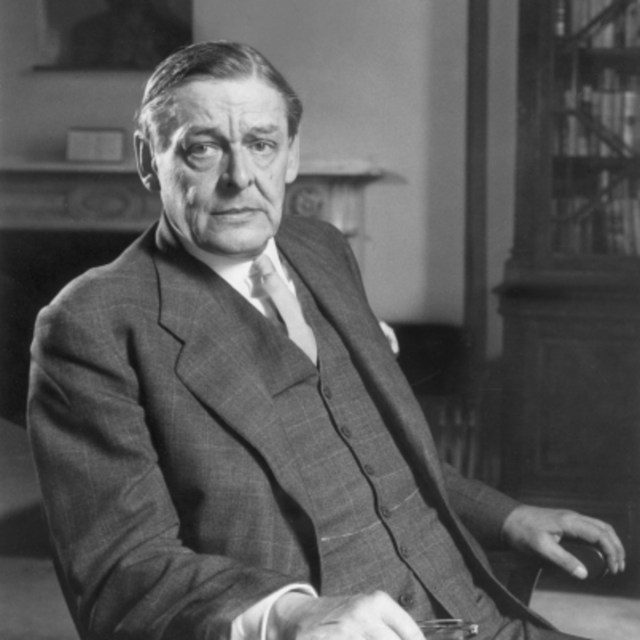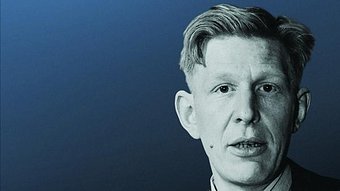
Journey of the Magi T.S. Eliot (1888-1965)
Eliot was born in St. Louis, Missouri and raised a Unitarian. After attending Harvard he went to Oxford in 1914 to work on a doctorate in philosophy. After his marriage in 1916 he had many many personal difficulties, which resulted in poems such as The Waste Land (1922) and The Hollow Men (1925). By the late twenties he was an Anglican, a UK citizen, and a monarchist. For many he may be best known for having written the book of light poetry which became the libretto for the musical Cats. Eliot won the Nobel Prize for Literature in 1948. This poem was written in 1927, a year after Eliot had converted to Christianity and had been baptized into the Church of England. The first lines echo a well known sermon by Lancelot Andrewes
A cold coming we had of it,
Just the worst time of the year
For a journey, and such a long journey:
The ways deep and the weather sharp,
The very dead of winter.
And the camels galled, sore-footed, refractory,
Lying down in the melting snow.
There were times when we regretted
The summer palaces on slopes, the terraces,
And the silken girls bringing sherbet.
Then the camel men cursing and grumbling
And running away, and wanting their liquor and women,
And the night-fires going out, and the lack of shelters,
And the cities dirty and the towns unfriendly
And the villages dirty and charging high prices:
A hard time we had of it.
At the end we preferred to travel all night,
Sleeping in snatches,
With the voices singing in our ears, saying
That this was all folly.
Then at dawn we came down to a temperate valley,
Wet, below the snow line, smelling of vegetation;
With a running stream and a water mill beating the darkness,
And three trees on the low sky,
And an old white horse galloped away in the meadow.
Then we came to a tavern with vine-leaves over the lintel,
Six hands at an open door dicing for pieces of silver,
And feet kicking the empty wineskins.
But there was no information, and so we continued
And arrived at evening, not a moment too soon
Finding the place; it was (you may say) satisfactory.
All this was a long time ago, I remember,
And I would do it again, but set down
This set down
This: were we led all that way for
Birth or Death? There was a Birth, certainly,
We had evidence and no doubt. I had seen birth and death,
But had thought they were different; this Birth was
Hard and bitter agony for us, like Death, our death.
We returned to our places, these Kingdoms,
But no longer at ease here, in the old dispensation,
With an alien people clutching their gods.
I should be glad of another death.

From The Summons, in For the Time Being: A Christmas Oratorio
W. H. Auden (1907-1973)
The following lines of poetry, in the voices of the three wise men, is an extract from a long, long poem – 62 pages – which was written by Auden in the early 1940s and published in 1944. Born in 1907, Auden is perhaps best known for his poem Funeral Blues (“Stop all the clocks”) (1936) which was featured in the film Four Weddings and a Funeral. In the 1930s many in Britain considered him the modernist successor to T.S. Eliot, and to escape such pressure and the resulting stultifying atmosphere he emigrated to the United States in early 1939. When war broke out he contacted the British embassy and offered his services, but he was told that men of his age were not yet needed; ultimately he served in the US Strategic Bombing Survey. The grandson of Church of England clergymen, Auden renounced his High Anglican faith as a teenager. However, in November 1939 he went to a German cinema in New York City, and as Edward Mendelsohn put it in a review of the book Auden and Christianity, the theatre
was showing an official German newsreel celebrating the Nazi victory over Poland. (Until the United States and Germany declared war, German films could be shown freely in American theaters.) Auden was startled by the shouts of “Kill the Poles!” that rose from the audience of ordinary German immigrants who were under no coercion to support the Nazis. He told an interviewer many years later: “I wondered, then, why I reacted as I did against this denial of every humanistic value. The answer brought me back to the church.”[1]
He eventually found his way to the American version of the Church of England in the United States, the Episcopal Church, and became a parishioner at St. Mark’s-in-the Bowery. For The Time Being was written and dedicated to his mother. It’s nine sections review the different elements of the Christmas story in a modernist vein – from the Annunciation to the fleeing of the Holy Family to Egypt. This extract comes from the section about the Star of Bethlehem and the magi. The wise men are, in a sense, modern as well. The first, echoing Roger Bacon, extracts knowledge from Nature, seeking Truth. The second is more of a social scientist, analyzing time and history to finds its mechanisms. The third is a psychologist who reduces love to utilitarian passions. All are drawn unaccountably by the star, calling into question their assumptions and biases. The fourth part, where all three speak, is a clear echo of Eliot’s poem above.
The First Wise Man
To break down her defenses
And profit from the vision
That plain men can predict through an
Ascesis of their senses,
With rack and screw I put Nature through
A thorough inquisition;
But she was so afraid that if I were disappointed
I should hurt Her more that Her answers were disjointed –
I did. I didn’t. I will. I won’t.
She is just as big a liar, in fact, as we are.
To discover how to be truthful now
Is the reason I follow this star.
The Second Wise Man
My faith that in Time’s constant
Flow lay real assurance
Broke down on this analysis –
At any given moment
All solids dissolve, no wheels revolve,
And facts have no endurance –
And who knows if this is by design pure inadvertence
That the Present destroys its inherited self-importance?
With envy, terror, rage, regret,
We anticipate or remember but never are.
To discover how to be living now
Is the reason I follow this star.
The Third Wise Man
Observing how myopic
Is the Venus of the Soma,
The concept Ought would make, I thought,
Our passions philanthropic,
And rectify in the sensual eye
Both lens-flare and lens-coma:
But arriving at the Greatest Good by introspection
And counting the Greater Number, left no time for affection,
Laughter, kisses, squeezing, smiles;
And I learned why the learned are as despised as they are.
To discover how to be loving now
Is the reason I follow this star.
The Three Wise Men
The weather has been awful,
The countryside is dreary,
Marsh, jungle, rock; and echoes mock,
Calling our hope unlawful;
But a silly song can help along
Yours ever and sincerely:
At least we know for certain that we are three old sinners,
That this journey is much too long, that we want our dinners,
And miss our wives, our books, our dogs,
But have only the vaguest idea why we are what we are.
To discover how to be human now
Is the reason we follow this star.
[1] Edward Mendelson,“Auden and God” reviewing Auden and Christianity, Arthur Kirsch (New Haven CT: Yale University Press, 2007) in The New York Review of Books December 6, 2007.

Nativity Poem
Joseph Brodsky (1940-1996)
Brodsky said about himself, “I’m Jewish; a Russian poet, an English essayist – and, of course, an American citizen.” Although born into a Jewish family, during the siege of Leningrad he was apparently baptized at the age of two in a country parish. He began writing poetry as a young man, and incurred the disapproval of the Soviet authorities. In 1972 he was expelled and, with W. H. Auden’s help, came to the United States. While he learned English and wrote essays in that language, his attempts at poetry in his adopted tongue were unsuccessful; he is thus known in English through skilled translations. He won the Nobel Prize for Literature in 1987. Starting in 1962 and continuing until his death he wrote an annual Christmas poem. While his own relationship to the Christian faith was ambiguous – he once joked that he was “a Christian by correspondence” – it is clear in his poems that he understood the implications of the Incarnation. He believed that “Christmas deals with the ‘calculation’ of life and the existence of the individual”. The following poem, written in Russian by Brodsky in 1989, was translated by the Irish poet Seamus Heany (Nobel Prize for Literature 1995) and published in 2000 in The New Yorker.
Imagine striking a match that night in the cave:
Imagine crockery, try to make use of its glaze
To feel cold cracks in the floor, the blankness of hunger.
Imagine the desert – but the desert is everywhere.
Imagine striking a match in that midnight cave,
The fire, the farm beasts in outline, the farm tools and stuff;
And imagine, as you towel your face in the enveloping folds,
Mary, Joseph, and the Infant in swaddling clothes.
Imagine the kings, the caravans’ stilted procession
As they make for the cave, or, rather, three beams closing in
And in on the star, the creaking of loads, the clink of a cowbell;
(No thronging of Heaven as yet, no peal of the bell
That will ring in the end for the infant once he has earned it).
Imagine the Lord, for the first time, from darkness, and stranded
Immensely in distance, recognizing Himself in the Son
Of Man: His homelessness plain to him now in a homeless one.

Love T.S Eliot. Wondrous selection – thank you
Reblogged this on Margarita García Alonso.
Pingback: How Will You Remember January 6? – Jim Harnish
Enjoyed this selection, so varied and so welcome in these dark days. Especially Elliot.